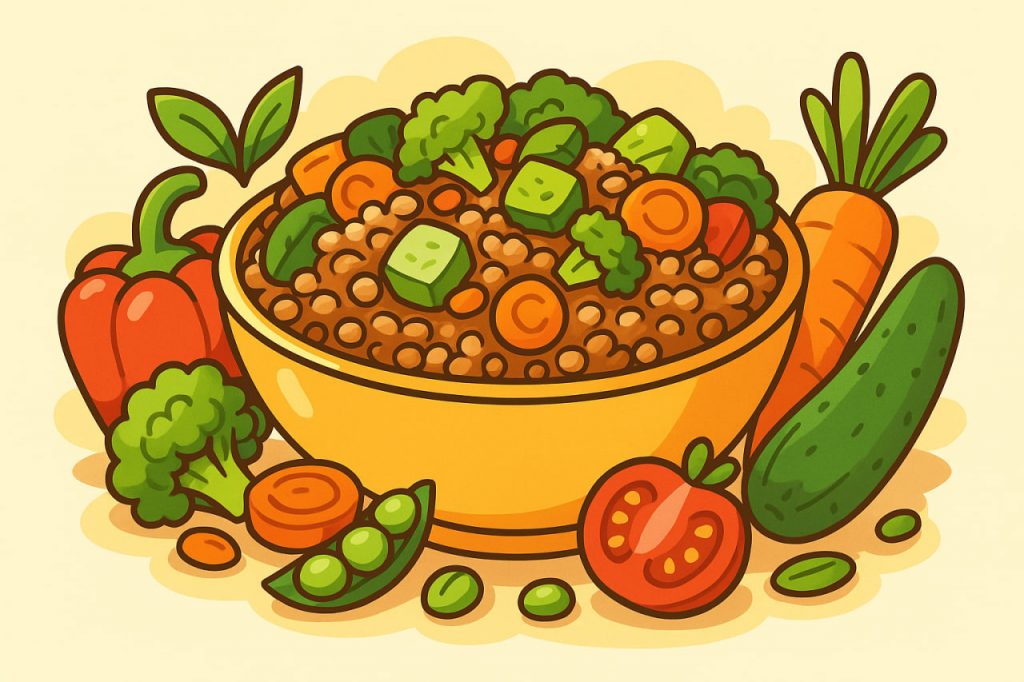Buckwheat porridge, often seen as a humble traditional dish, is in fact one of the most nutrient-rich and versatile superfoods available today. Amid growing trends in healthy eating and clean living, buckwheat is regaining popularity as a gluten-free, plant-based source of essential nutrients. Whether you aim to support heart health, manage weight, or improve digestion, buckwheat offers benefits for everyone.
1. Nutrient Powerhouse: Rich in Vitamins and Minerals
Buckwheat is loaded with essential vitamins like B1, B2, B3, B5, B6, B9, as well as vitamin E and the bioflavonoid rutin (vitamin P). These contribute to energy production, brain function, skin health, and immune defense.
Minerals in buckwheat include:
- Iron – supports oxygen transport and prevents anemia
- Magnesium – calms the nervous system and lowers stress
- Potassium – maintains healthy blood pressure
- Phosphorus & Calcium – essential for strong bones and teeth
- Zinc & Copper – support immune health and metabolic activity
2. Heart Health and Cholesterol Management
Rutin, a plant flavonoid in buckwheat, strengthens blood vessels and reduces inflammation. Regular consumption may help reduce LDL (bad cholesterol) and lower the risk of heart disease and stroke. The combination of potassium and magnesium further helps maintain healthy blood pressure levels.
3. Blood Sugar Control and Diabetes Support
Buckwheat has a low glycemic index (GI) of around 50, making it ideal for people with type 1 or type 2 diabetes. It slows the absorption of glucose into the bloodstream, preventing sudden spikes in blood sugar levels. It also contains resistant starch, which acts as a prebiotic and supports gut health.
4. Weight Loss and Satiety
Rich in both fiber and plant-based protein, buckwheat porridge helps you feel full for longer. This reduces snacking and helps with calorie control. Its slow-digesting carbohydrates provide sustained energy, which is crucial for people managing weight or blood sugar fluctuations.
5. Digestive Health and Gut Balance
Thanks to its high content of insoluble fiber, buckwheat promotes healthy bowel movements and improves digestion. It feeds beneficial gut bacteria and supports detoxification by encouraging natural elimination of waste and toxins.
6. Naturally Gluten-Free and Hypoallergenic
Buckwheat is not a grain, and it contains no gluten. This makes it safe for people with celiac disease or gluten sensitivity. It’s also rarely associated with allergic reactions, making it an excellent choice for people with sensitive digestion or those on restrictive diets.
7. Ideal for All Ages and Diets
- Safe for children and seniors
- Supports pregnancy and postpartum nutrition
- Great for vegetarian and vegan diets
- Perfect during fasting or detox periods
How to Cook Buckwheat for Maximum Nutrition
To keep its nutrients intact, cook buckwheat with minimal processing. Use raw (green) buckwheat whenever possible and soak it overnight to reduce antinutrients and preserve vitamins. Avoid boiling it for too long or mixing with salty sauces that reduce its health benefits.
Conclusion
Buckwheat is a powerful yet often overlooked superfood that supports overall well-being. From cardiovascular protection and blood sugar stability to digestive support and weight management, this ancient pseudograin deserves a central place in the modern diet.
Include buckwheat 3–4 times per week and your body will thank you with more energy, better digestion, and long-term vitality.
Glossary of Terms
- Glycemic Index (GI): A value that indicates how quickly a food raises blood glucose levels. Lower is better for diabetes control.
- Resistant Starch: A type of carbohydrate that resists digestion and feeds good gut bacteria, acting like soluble fiber.
- Rutin: A bioflavonoid that supports blood vessel health and acts as an antioxidant.
- Insoluble Fiber: The part of plant foods that passes through the digestive system, adding bulk and helping prevent constipation.
- LDL Cholesterol: “Low-density lipoprotein,” also known as bad cholesterol. High levels are associated with heart disease.
- Hypoallergenic: Less likely to cause allergic reactions.


Let’s make tomorrow better than yesterday!